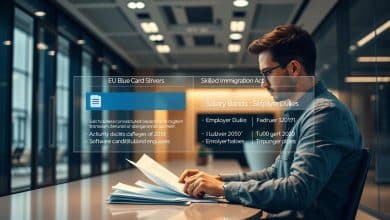San Francisco Marriage Visa Sponsorship: Benefits & Application Timeline
Navigating the path to reunite with a spouse in the United States involves careful planning.
For couples in the Bay Area, this journey often starts with understanding legal requirements and timelines. Professional guidance ensures compliance with federal regulations while avoiding costly delays.
The process typically takes 10–12 months for partners of U.S. citizens. Permanent residents may wait closer to two years. Each case requires thorough documentation, including proof of genuine relationships and financial stability. Missing a single form can reset progress, making precision critical.
Local legal experts simplify these steps. With over two decades of experience, firms like Warren Law Firm specialize in streamlining applications. Their team handles everything from USCIS filings to embassy interviews, reducing stress for families.
Preparation is key. Couples should anticipate fees, medical exams, and background checks. Knowing what to expect fosters confidence during waiting periods. Patience paired with professional support transforms a complex system into a manageable journey.
Understanding Marriage Visas & Visa Sponsorship in San Francisco
Couples navigating immigration benefits must grasp how spousal visas operate. These documents provide foreign partners of American nationals a direct route to residency. Two primary categories exist for different marital situations.
Types of Partner-Based Immigration Documents
The CR-1 visa suits couples married under two years, granting conditional residency. After two years of marriage, the IR-1 offers permanent status immediately. Partners of green card holders qualify for F-2A visas, though wait times often exceed other categories.
Financial Responsibilities in Partner Immigration
Sponsors must prove income meeting 125% of federal poverty guidelines. This requirement applies whether petitioning for a spouse or fiancé. Legal experts note “the affidavit of support becomes enforceable once visas are issued”, creating decade-long obligations.
Local legal teams help manage USCIS paperwork and embassy interviews. Their knowledge of regional requirements proves vital for applications involving Nigerian documentation. Proper guidance reduces delays caused by incomplete forms or missed deadlines.
Benefits of Marriage Visas in the U.S. Immigration Process
Securing legal status through family-based immigration unlocks life-changing opportunities. Unlike temporary work permits, this pathway prioritizes stability while removing employment or location restrictions.
Pathway to a Green Card
Approved applicants receive permanent resident status immediately upon entering the country. This eliminates years of uncertainty common with other visa types. Green card holders gain full rights to work nationwide without employer ties or geographic limitations.
The process accelerates citizenship eligibility. Spouses of U.S. citizens can apply for naturalization after three years of continuous residence. One immigration attorney notes, “This timeline often surprises families—it’s faster than most employment-based options.”
Family Unity and Long-Term Stability
Permanent residency allows sponsoring parents, children, or siblings after meeting specific requirements. Families build futures together through access to education loans, healthcare programs, and social security benefits.
Travel flexibility strengthens international connections. Unlike temporary visa holders, green card recipients maintain status during extended overseas visits. This stability supports career growth and multigenerational planning across borders.
Navigating U.S. Immigration Law for Marriage Sponsorship
Understanding America’s legal framework is critical for successful family reunification. The Immigration and Nationality Act (INA) forms the backbone of all immigration processes, dictating eligibility and procedural requirements. Three key agencies enforce these rules: USCIS handles applications, ICE monitors compliance, and CBP manages border entries.
Core Components of Family Immigration Law
Deadlines and documentation standards leave little room for error. Missing a form or filing late can derail cases for months. “Immigration law evolves constantly,” notes a Bay Area attorney. “Last year’s policy might not apply today.”
Federal statutes override state laws, ensuring uniform standards nationwide. This prevents confusion but demands precise adherence to national guidelines. Applicants must also navigate fraud detection systems, which scrutinize relationships through interviews and evidence reviews.
Legal intersections add complexity. Tax filings, criminal records, and custody agreements often influence outcomes. Nigerian couples, for example, may need extra documentation like traditional marriage certificates for USCIS approval.
Professional guidance helps interpret these layers. Experts track legislative changes affecting fees, processing times, and eligibility criteria. Their knowledge transforms intricate legal jargon into actionable steps for families.
Detailed Application Timeline and Process
The journey toward family reunification follows a structured path with defined phases. Clear understanding of each step helps applicants manage expectations while preparing necessary documentation.
Filing, Processing, and Interview Stages
Applicants start by submitting Form I-130 to USCIS. This form establishes the family relationship and triggers the review process. Most cases receive a receipt notice within three weeks.
Initial verification typically takes 5-8 months. During this phase, officials assess financial stability and relationship authenticity. Approved petitions then move to the National Visa Center for further review.
The NVC stage involves submitting tax records, birth certificates, and other civil documents. This step usually adds three months to the timeline. Once complete, cases transfer to U.S. embassies for final steps.
Expected Timeframes and Milestones
Consular processing includes medical exams and interview scheduling. Embassy wait times vary—some locations process requests faster than others. “Always check your embassy’s current backlog,” advises an immigration specialist.
Successful interviews lead to visa issuance within 10 days. Recipients must enter the U.S. within six months to activate permanent residency. Physical green cards arrive by mail 4-8 weeks after arrival.
Total processing averages 10-12 months for citizen sponsors. Green card holders sponsoring spouses often wait closer to two years. Delays typically stem from incomplete forms or additional evidence requests.
Key Eligibility Criteria for Marriage Sponsors
Meeting federal standards determines whether couples can begin their immigration journey. Two pillars form this foundation: financial stability and authentic partnership documentation.
Financial Requirements and Affidavit of Support
Sponsors must show income reaching 125% of federal poverty guidelines. This threshold adjusts based on household size—a family of four needs $39,000 annually. The legally binding Form I-864 commits sponsors for decades. “This isn’t just paperwork—it’s a promise to prevent public charge concerns,” explains a Bay Area immigration specialist.
Those falling short can use assets or joint sponsors. Retirement accounts and property often qualify if their value exceeds income gaps by five times. Tax returns and employer letters solidify these claims.
Proof of Genuine Relationship
Officials scrutinize relationships to prevent fraudulent claims. Shared financial accounts and co-signed leases demonstrate daily partnership. Photos showing milestones—weddings, holidays, family gatherings—carry weight when dated and labeled.
Third-party affidavits from friends add credibility. One couple from Lagos included WhatsApp logs spanning three years. U.S. citizens face fewer restrictions but identical evidence standards. Background checks ensure sponsors honor past legal obligations.
Role of a San Francisco Immigration Attorney in Your Case
Partnering with legal experts transforms complex immigration procedures into manageable steps. Seasoned professionals decode regulations while shielding families from common pitfalls. Their oversight often becomes the difference between approval and costly setbacks.
Expert Guidance on Legal Documentation
Attorneys review every form for accuracy before submission. They cross-reference requirements across agencies like USCIS and NVC. “Missing one checkbox can trigger months of delays,” notes a legal team member. This precision prevents requests for additional evidence.
Specialists analyze country-specific challenges too. Nigerian couples might need extra verification for traditional ceremonies. Lawyers prepare clients for embassy interviews through mock sessions and document coaching.
Personalized Case Preparation
Every situation receives tailored strategies during initial consultations. Teams examine financial histories, prior immigration attempts, and relationship evidence. They create timelines accounting for embassy backlogs or policy shifts.
Continuous updates keep families informed as cases progress. Legal professionals intervene immediately if complications arise. Their experience turns overwhelming processes into clear, actionable steps toward reunification.
Working with Immigration Professionals: What to Expect
Engaging legal experts transforms complex immigration procedures into clear pathways. Initial consultations map out each family’s unique situation. Professionals analyze financial histories, prior applications, and relationship evidence to predict potential roadblocks.
Secure online portals streamline document sharing while protecting sensitive information. Clients upload birth certificates, tax records, and marriage proofs through encrypted systems. “Supervisory reviews catch errors before submission,” explains a legal team member, reducing delays from incomplete forms.
Dedicated caseworkers match clients’ needs based on embassy locations and language requirements. Nigerian families often receive specialists familiar with Lagos consulate protocols. Regular updates via email or SMS keep people informed about policy changes or required actions.
Multilingual support bridges communication gaps during embassy interviews or paperwork reviews. Comprehensive services include mock interview drills and emergency consultations for urgent issues like visa denials. Legal teams maintain ethical relationships with consular officers to address unexpected hurdles efficiently.
Families gain confidence knowing professionals handle deadlines, translations, and evidence organization. This structured approach turns bureaucratic challenges into manageable steps toward reunification.
Strategies for a Smooth Visa Application Journey
A well-organized approach significantly improves outcomes in immigration processes. These methods help applicants navigate complex requirements while maintaining control over timelines.
Document Preparation and Evidence Gathering
Start by creating a master checklist of required materials. Digital backups of birth certificates, financial records, and relationship proofs prevent last-minute scrambles. Color-coded folders streamline access during interviews or submissions.
Authentic evidence matters most. Officials value time-stamped photos, shared utility bills, and travel itineraries. Nigerian applicants often strengthen cases with traditional marriage documents alongside civil certificates.
Timely Submission and Follow-Up
Set calendar reminders for form expiration dates and agency deadlines. Allow extra weeks for international mail delays. Many consulates now offer online tracking portals—check them weekly for updates.
Proactive communication resolves issues faster. If a response takes longer than posted processing times, send polite inquiries through official channels. Legal teams can escalate urgent cases when necessary.
Overcoming Common Obstacles
Missing documents remain the top cause of delays. Prepare certified translations early for non-English materials. Address name discrepancies across records before submitting forms.
Changing circumstances like job loss require immediate action. Supplement income gaps with joint sponsors or liquid assets. Experienced professionals help adjust strategies without restarting the entire process.
Every situation demands flexibility. With careful planning and responsive adjustments, families transform challenges into stepping stones toward their goals.
For more information, explore the official visa website mentioned in this article:
You will be redirected to another website
FAQ
What is a marriage-based visa?
A marriage-based visa allows a U.S. citizen or lawful permanent resident to sponsor their spouse for legal entry and residency. It serves as a step toward obtaining a green card and eventual citizenship.
How does sponsorship work for couples in San Francisco?
Sponsorship requires the U.S. citizen or permanent resident to file an affidavit of support, proving they can financially support their spouse. This process involves submitting forms, evidence of a genuine relationship, and attending interviews.
What benefits do marriage-based visas provide?
These visas offer a direct pathway to lawful permanent residency, family reunification, and eventual eligibility for citizenship. They also provide stability for couples navigating the immigration system together.
What legal requirements apply to sponsors under U.S. immigration law?
Sponsors must meet income thresholds, submit tax records, and sign a legally binding affidavit of support. They must also prove their marriage is legitimate and not solely for immigration purposes.
How long does the application process typically take?
Processing times vary but often take 12–24 months. Delays may occur due to incomplete documentation, background checks, or interview scheduling backlogs at local offices.
What evidence proves a genuine marital relationship?
Joint bank accounts, shared leases, photographs, communication records, and affidavits from friends or family help demonstrate authenticity. Consistency in testimonies during interviews is critical.
Why involve an immigration attorney in the process?
Attorneys clarify complex laws, prepare paperwork to avoid errors, and represent applicants during interviews. Their expertise reduces risks of delays or denials due to technicalities.
How can applicants avoid common delays?
Submitting error-free forms, organizing evidence early, and responding promptly to requests from USCIS minimizes setbacks. Regular follow-ups ensure cases stay on track.
Published on: 19 de August de 2025

Galena Garcia
Galena Garcia is the visionary behind Portal Santista. With a degree in Business Administration and a specialization in Marketing for the financial sector, Galena brings years of experience from the corporate world, where she developed a deep passion for helping both businesses and individuals thrive financially.
Driven by a desire to share her knowledge with a broader audience, she founded Portal Santista—an online space dedicated to providing useful, practical, and reliable information on finance, marketing, and business management.
Outside of her professional life, Galena is an animal lover, a devoted reader of romantic novels, and loves spending fun moments with her nieces and nephews. Her unique blend of technical expertise and genuine care for people is what makes Portal Santista such a special place.






